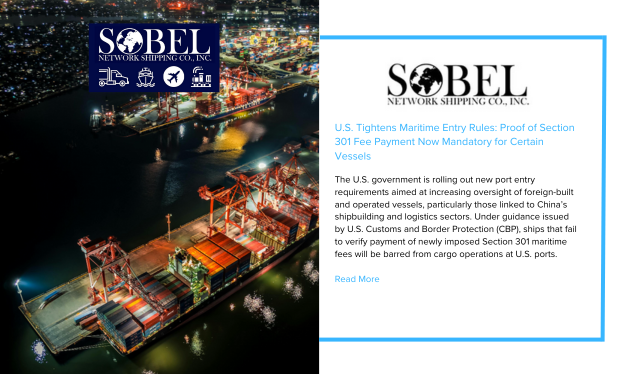The U.S. government is rolling out new port entry requirements aimed at increasing oversight of foreign-built and operated vessels, particularly those linked to China’s shipbuilding and logistics sectors. Under guidance issued by U.S. Customs and Border Protection (CBP), ships that fail to verify payment of newly imposed Section 301 maritime fees will be barred from cargo operations at U.S. ports.
The policy, effective October 14, 2025, follows the Office of the U.S. Trade Representative’s (USTR) findings that China’s state-supported maritime programs distort fair competition and pose potential national security concerns. These findings stem from an expanded Section 301 investigation into global shipping and shipbuilding practices launched earlier this year.
According to CBP’s implementation notice, vessel operators — not the agency — are solely responsible for determining whether their ships are subject to the charges and for ensuring payment prior to arrival.
Fee Structure Highlights
-
Chinese-owned or -operated vessels: US$50 per net tonne
-
Chinese-built ships: US$18 per net tonne or US$120 per container discharged, whichever is greater
-
Vehicle carriers and roll-on/roll-off vessels: US$14 per net tonne
-
Liquefied natural gas (LNG) carriers: Exempt from the new fees
All payments must be submitted through the U.S. Treasury’s Pay.gov platform, which is directly integrated with the Vessel Entrance and Clearance System (VECS). The system will confirm payment status before granting port clearance. CBP recommends completing transactions at least three business days before arrival to prevent operational delays or denials.
Strategic and Industry Impact
The rule represents a significant shift in how the U.S. enforces maritime trade compliance, reflecting broader efforts to strengthen supply chain resilience and national security oversight within global logistics networks. Analysts anticipate that the new cost structure could influence vessel deployment strategies, shipping routes, and carrier scheduling as companies work to offset potential financial impacts.
CBP noted that further procedural details — including audit guidance, dispute resolution, and verification protocols — will be outlined in an upcoming Federal Register publication.


